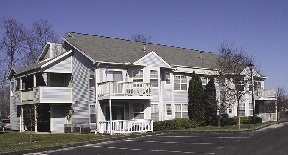Based in New Haven, Steve Witten consistently ranks as one of the top multifamily investment specialists at Marcus & Millichap Real Estate Investment Services. A senior investment associate and senior director in the firm's National Multi Housing Group, with 30 years in the business, Witten joined Marcus & Millichap in July 1999. He has received the firm's prestigious National Achievement Award seven times and the Sales Achievement Award eight times.
This year, Witten expects to close approximately $350 million in multifamily investment sales. He has arranged a number of recent sales transactions in New England and across the United States. He and his partner Victor Nolletti recently closed on the sale a 180-unit multifamily community in Meriden for $33.5 million; a 378-unit multifamily community in Tampa, Fla. for $51 million; and a 1,597-unit multifamily portfolio in Tennessee for $71 million.
Witten's private and institutional clients benefit from Marcus & Millichap's national marketing platform that can access capital from across the United States, his local market knowledge, his multifamily market expertise and an unrivaled access to qualified investors.
Through Marcus & Millichap's National Multi-Housing Group, Witten has access to the nation's highest quality inventory of multi-family properties. NMHG's inventory contains one of the largest selections of investment options supported by a high standard of pricing and underwriting. Investors also benefit from Marcus & Millichap's value-added services, including competitive financing and market research. Solidifying the firm's commitment to specialization, the NMHG works closely with multifamily investors in securing investment opportunities that meet their short-term and long-term objectives.
NMHG's inventory of multifamily properties can help investors meet their objectives due to its national scope, diversity of product, information standards and quality. The group's underwriting standards and management-driven quality control assure that every property represented is deliverable with credible and current information. The group's inventory is constantly changing and expanding, allowing its more than 450 NMHG professionals in markets nationwide to provide multifamily investment opportunities to investors on an ongoing basis. In 2006, the NMHG assisted investors in purchasing more than 2,200 multifamily properties with a combined market value in excess of $9 billion.
Looking at economic conditions and investment trends for the upcoming year, moderate economic expansion is forecast for 2008, as healthy business investment and stronger export activity help to offset slower consumer spending growth and the drag of housing-related industries. Tighter residential lending standards are exacerbating housing market woes in Connecticut and across New England. Existing single-family home sales are down 25% from one year ago, and available for-sale inventory has increased 45% to 10.5 months of supply. Apartment owners are facing added competition from shadow rentals as a result but will remain net beneficiaries of the housing downturn due to the expanding renter pool. In addition to greater apartment renter retention generated by more stringent mortgage requirements, owners will also benefit from the return of many homeowners to apartments as ARMs reset at substantially higher rates.
One of the most significant risks to the near-term economic outlook is eroding business confidence, as nonresidential spending is expected to account for a larger share of overall U.S. GDP this year. Though risks are elevated, indicators continue to reflect the relative strength of the U.S. economy. Core inflation appears to be under control, even as oil prices hover between $90 and $100 per barrel, and employment and productivity growth continue to surprise to the upside. With core prices rising at a relatively tame pace, the Fed's ability to steer the economy away from recession should remain intact this year. The dollar has continued to weaken against foreign currencies in recent months, adding to volatility in financial markets but driving up exports and tourism. Corporations with major foreign operations will fare well, and export activity is expected to accelerate, narrowing the trade gap. Consumers have been a key driver of growth over the past several years and have proven surprisingly resilient; however, the effects of declining home equity withdrawal and high fuel prices will weigh more heavily on retail sales growth in 2008.
In New England, the Class B/C market is expected to offer strong buying opportunities over the next few years. Pension funds and institutional investors have shown a preference for Class A assets, resulting in high demand by private and entrepreneurial investors in the lower tier (Class B & C) product type. Given that current lending standards are here to stay, cap rates for Class B/C properties could rise by as much as 50 to 100 basis points. Ironically, renter demand for more affordable apartments is less vulnerable to swings in the housing market. If housing prices decline significantly, renter loss to homeownership would be limited primarily to the Class A sector. Furthermore, recent absorption trends suggest the Class B/C sector is already accelerating. Late last year, overall absorption moved at its strongest pace since 2000, with the lower tiers accounting for the most significant share of the total since the 1990s.
Tags:
Steve Witten ranks as one of the top multifamily investment specialists
January 03, 2008 - Connecticut












